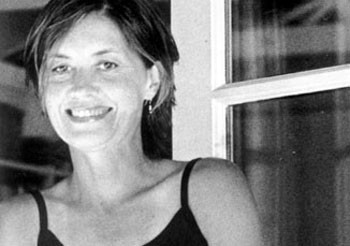Photograph by Richard Upton
The Queen Of Forestville: Julia Whitty charts new territory.
Deep Ecology
Julia Whitty crafts a careful collection
By Jill Koenigsdorf
Forestville author Julia Whitty’s debut short-story collection, A Tortoise for the Queen of Tonga (Mariner Books; $12), is that rarest of birds: a collection of fiction that educates as well as entertains. Mining a large body of knowledge about the natural world from her 20-odd years making documentary films on everything from sharks to spinner dolphins to manatees, Whitty tackles life’s larger concerns: death, reproduction, extinction, loneliness, evolution, suicide, poetry, trust, and humanity’s responsibility and relationship to other species. The 10 stories that compose this book span the globe, exploring flora and fauna, covering vast bodies of historic and scientific terrain. We enter caves in the Dordogne, feel the cruel captivity of the creatures at Ocean World in Florida, go on a safari gone awry in Botswana, spend time with several generations of Tongan royalty, get a glimpse of what Heaven might be like with Darwin and Richard Feynman as residents, even tag along on a scientific dive that has great repercussions for two male friends in Antarctica.
Clearly, from the opening sentence of the O. Henry Award-winning title story–“She died in the palace gardens in 1966, of extreme old age and a heart that had swelled insupportably from nearly two centuries of loneliness”–we are in for an amazing journey. The only thing short about these stories is their length.
There has been a trend in short-story collections in recent years to make them interconnected, as if each story were more like a chapter in a seamless longer work, and I think it is to Whitty’s credit that hers are so distinct. If there is a common thread, it’s the harm done when we remain unconscious of other species or of our own blind spots. It is a tricky task to have a short work of fiction carry such warnings without the author sounding like she is on a soapbox, but Whitty gets her message across in writing that remains alive.
“Lucifer’s Alligator,” a heartbreakingly strong cautionary tale of the hopelessness of creatures in captivity, is a prime example: “Lucifer had been at Ocean World the longest. Twenty years, Amanda, the oldest of the manatees reckoned: crunching on carrots, counting the bites, measuring the steady disintegration of cellulose into liquid. She grew panicky when carrots were scarce. Without carrots, there was no counting and without counting there was no time, therefore no motion, no approach of deliverance.” Perhaps not since Orwell’s Animal Farm has anthropomorphizing been as powerful a literary tool as it is in this story, and again in the title piece, where we see war, birth, death, and the transformation of an entire culture through the eyes of a tortoise.
When Whitty’s settings move closer to home, she writes of the strength of women on their own. In “The Story of the Deep Dark” we meet Phoebe, who “runs a computerized graphics animator called a Harriet in a video house in San Francisco, where her purpose is to transform her clients’ products into things of magic: cans of cat food into waltzing tunas, aspirin into the soothing hands of a masseur, cereal boxes into blooming jungles.”
Phoebe travels to France after breaking up with her boyfriend because he wants children and she does not. She goes to see the cave art of the Dordogne and is immediately confronted with prehistoric depictions of many of the issues she is wrestling with–fertility, males and females, power–which ultimately help her realize that she has made the right decision.
Whitty is best at making complex and seemingly esoteric realms come to life for the layperson. You don’t need to be a scientist to imagine Darwin’s pleasure in seeing the organisms known as cyanophytes, or blue-green algae, when he thinks he may have discovered, posthumously, the origin of life on Earth (“Darwin in Heaven”).
The weakest story in the collection, “Stealing from the Dead,” is also the least nature-related and deals instead with a May-September romance between a young artist and a Byron scholar. After so many stories of life-and-death struggles (and here I think of the wonderful passage in the strongest story, “Senti’s Last Elephant,” where a young girl on safari smells a bad odor, and her mother asks the guide Senti: “‘Is something dead?’ Something is always dead, thinks Senti, but he turns his head and says over his shoulder, ‘No. Just these trees smell dead.'”), we have simply come to expect Whitty to lead us into uncharted territory and to illuminate beautifully all that we encounter there.
Julia Whitty will be reading from her book on Tuesday, July 16, at 7pm at Copperfield’s Books in Sebastopol, 138 N. Main St., 707.823.2618.
From the June 6-12, 2002 issue of the North Bay Bohemian.









